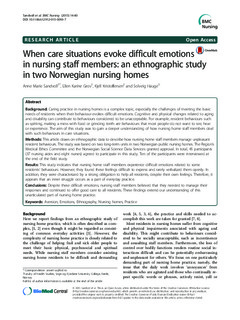| dc.description.abstract | Background Caring practice in nursing homes is a complex topic, especially the challenges of meeting the basic needs of residents when their behaviour evokes difficult emotions. Cognitive and physical changes related to aging and disability can contribute to behaviours considered to be unacceptable. For example, resident behaviours such as spitting, making a mess with food or grinding teeth are behaviours that most people do not want to see, hear or experience. The aim of this study was to gain a deeper understanding of how nursing home staff members deal with such behaviours in care situations. Methods This article draws on ethnographic data to describe how nursing home staff members manage unpleasant resident behaviours. The study was based on two long-term units in two Norwegian public nursing homes. The Region’s Medical Ethics Committee and the Norwegian Social Science Data Services granted approval. In total, 45 participants (37 nursing aides and eight nurses) agreed to participate in this study. Ten of the participants were interviewed at the end of the field study. Results This study indicates that nursing home staff members experience difficult emotions related to some residents’ behaviours. However, they found these feelings difficult to express and rarely verbalized them openly. In addition, they were characterized by a strong obligation to help all residents, despite their own feelings. Therefore, it appears that an inner struggle occurs as a part of everyday practice. Conclusions Despite these difficult emotions, nursing staff members believed that they needed to manage their responses and continued to offer good care to all residents. These findings extend our understanding of this unarticulated part of nursing home practice. | |

